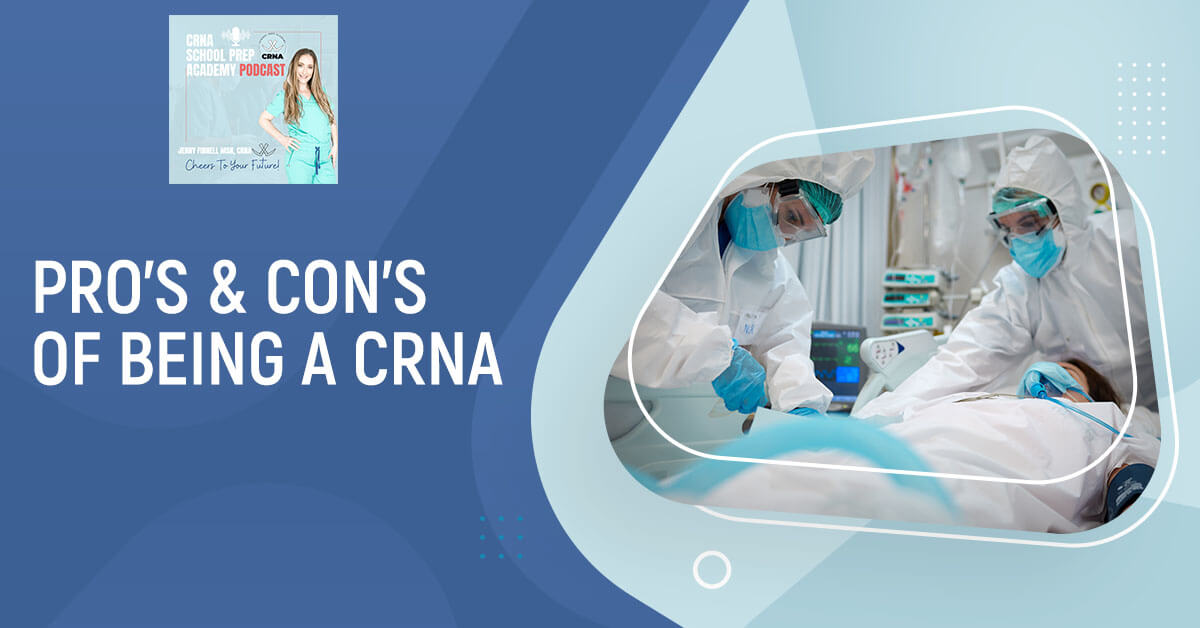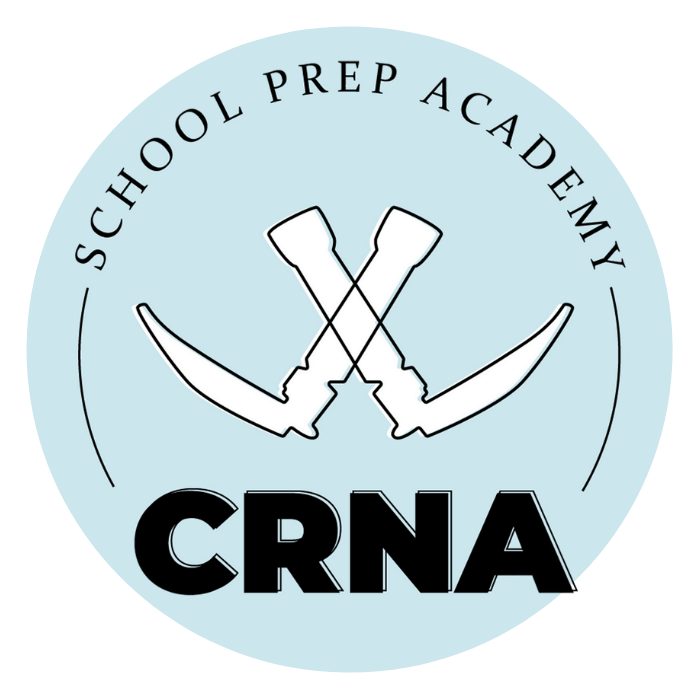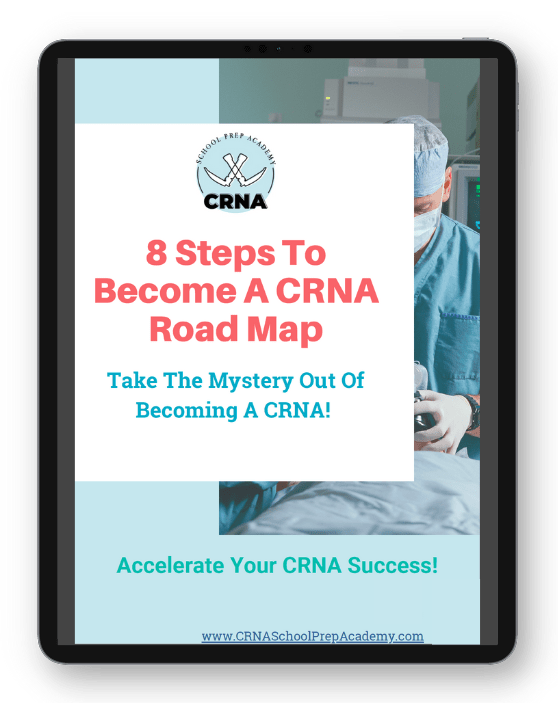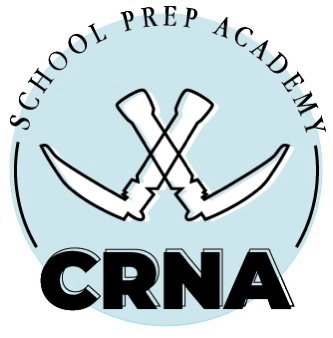
Does being a CRNA seem too good to be true? Knowing what to expect ahead of time sets you up for success as a student and as a provider. Today, we’re detailing some of the biggest pros and cons of being a CRNA for you!
In addition to this episode, as always, it is recommended that you continue to network and ask other CRNAs for their opinions on the career, as well!
In this week’s episode, we’re getting real about the CRNA career and diving into-
- The variety that you can expect to see during each shift (and how this can challenge you to grow as a provider!)
- Opportunities you will have as a CRNA to utilize your critical thinking skills and independent thought as a leader at the head of the bed
- What to expect in terms of your schedule flexibility and break times on your shifts
- Effectively working as a team member and building relationships with people you work with
- Navigating unfamiliar and uncomfortable new situations
- Asking questions when you need to and utilizing your resources for your patients
Happy listening, future CRNA! Cheers to an incredible career just beyond the horizon!
Get access to planning tools, valuable CRNA Faculty guidance & mapped out courses that have been proven to accelerate your CRNA success! Become a member of CRNA School Prep Academy here:
https://www.crnaschoolprepacademy.com/join
Book a mock interview, resume edit or personal statement critique:
Join the CSPA email list: https://www.cspaedu.com/podcast-email
Send Jenny an email or make a podcast request!
Hello@CRNASchoolPrepAcademy.com
—
Watch the episode here
Listen to the podcast here
Pros & Cons Of Being A CRNA
Pros: The Variety
I’m excited to share this episode with you. We’re going to cover the pros and cons of becoming a CRNA. This is all my opinion. I encourage you when you do your shadowing and when you’re trying to network, as I always talk about, try to ask CRNAs what their pros and cons are because I guarantee they’re going to maybe say something slightly different or maybe you’re going to hear some recurring themes. I encourage you to seek out more than just my opinion, but I’m happy to share with you what my opinions are. Let’s go ahead and get into it. To start with some pros, one of the pros that I find to be true is the variety.
My background is as an ICU nurse in medical ICU. Not that I thoroughly enjoyed that patient population, to say the least, but you saw a lot of comorbidities, multiorgan failure, essentially, respiratory failure, that type of thing. When you’re a CRNA, you get to see a wide range of different types of patient population. You could literally do a C-section in one day and then go down and do an open-heart, or you can do an open-heart, and then later in the evening, you can do a lap appy on a seven-year-old. There’s such a wide variety in one shift, let alone in the aspect of over a year. Where I worked, I would do neuro cases where they’d be craniotomies or operating on the brain.
I do cases where they would do EP studies, maybe like an AFib ablation where they’re bleeding a little part of someone’s heart. I could do a lot of ortho. I could do robotics. I could do bariatrics for the Roux-en-Ys, the endoscopies, colonoscopies. I could do TURPs or ESWLs. I encourage you to google some of these terms I’m throwing out there. That’s for kidney stones. You do a wide variety. We even sedate patients to go to the MRI suite or to IR for an LP, Lumbar Puncture. A wide variety of patient population. That’s one of the things I like about anesthesia. All day long, you’re doing a variety of cases.
Pros: Independent Thought
Where I work, it’s a pediatric hospital, but you might think, “It’s just peds.” Not really. We also do adult burns. We’re the only burn center in town. We get these 70-year-olds who have 60% of their body surface area burned. That’s a big case. We do get kids who get burned too. You can literally go from doing a pediatric case on, say, a 2-kilo baby to the next case being a sixteen-year-old that’s adult size. It’s a wide range of a variety of patients that you can see in one day. I enjoy that. Independent thought, I wrote that down because, as a CRNA, you get to hone in on your critical thinking skills and coming up with, “This is what I anticipate needing for this patient. This is what I’m going to do about it.”
Independently coming up with a plan of care for your patient. Not that you didn’t do that as an ICU nurse because you did, but it’s way more tailored and intricate than I remember at least doing. I remember having ideas of what my patient needed and bringing it to the table during rounds. However, I feel like when you’re in the operating room and you’re seeing them from start to finish in surgery, it’s a lot more hands-on planning and anticipating, making the road and pathway so when they go to recovery, it’s going to be smooth. The planning for intubation alone can be a lot of work. The wake-up can be tricky. Waking up someone from anesthesia is way trickier than going to sleep.
They always say anesthesia is like flying a plane. The takeoff and landing are the most critical parts of anesthesia. Don’t get me wrong. Things can still happen, a mist in the air. Your engine could go out or a bird could hit your propeller, but stuff can still happen in the middle of the surgery. By far, the riskier parts are induction and emergence. Think about it, if someone has an operation, let’s say they have a carotid. You try to plan the smoothest emergence as possible because if that patient were to buck and cough, what if they get a hematoma that causes tracheal deviation? Now it’s an emergency to go back to sleep and relieve the hematoma so they can have a windpipe again.
Like flying a plane, the takeoff and landing are the most critical parts of anesthesia. Click To TweetThat’s the kind of stuff that can happen. They can bleed into their brain. A whole bunch of things could go wrong if you don’t have that smooth emergence, but yet you need them to wake up and follow commands because what if they stroke during the surgery? Think about that one for a little bit. It’s tricky and challenging. Even a thyroid can be tricky to wake up. It’s the same thing. They had surgery on their neck. You don’t want them to cough and buck when they wake up because, again, they can get a hematoma. A hematoma is where blood accumulates underneath the skin. It can cause your windpipe to potentially shut if it gets bad enough. Those are some examples. Let’s say a tricky induction could be someone with an EF at 10%.
Pros: Hands-On Skills
What if their heart functions so poorly that you have to be super gentle to get them to go to sleep? You obviously don’t want them to have recall. You need to get them enough sedation to where they won’t remember you putting the tube down their throat, but you need to be gentle enough to where their pressure’s not going to tank and you’re going to code during the induction. That’s an example of a challenge induction that you may have to come up with a plan A, B, and C. That’s what I mean by independent thought and critical thinking type skills. If you’d like to be hands-on, CRNA is for you. I love being hands-on and sticking IVs on people and starting A-lines. It sounds a little weird, but I know my IV stick stickers are out there.
I’m not a picker, though. For those of you who like to pick patients, that’s disgusting. I even say that on my show, but I know the pickers are out there too. I’m not a picker, but I’m a sticker. Anyhow, if you like hands-on skills, you would love being a CRNA because you get to do epidurals, spinals, central lines, A-lines, intubations, peripheral nerve blocks, ultrasound. There’s POCUS now, which is Point of Care Ultrasound. You could literally take your little butterfly, which is a portable ultrasound machine and scan your patient’s stomach and call them out if they’ve had breakfast that morning, because you can scan their stomach to see if they’re truly NPO. There are all kinds of cool things you can do these days.
Pros: Scheduling Flexibility
Hands-on skills, if you like that, this would be your jam, scheduling flexibility. It’s funny when I thought about becoming a CRNA, one of my pain points as a nurse was I hated my schedule. I hated the idea of missing holidays and weekends. I’m like, “I want to have a family someday. I don’t want to miss every Christmas or every other Christmas. I don’t want to be working all night, sleep all day, and yell at my kids when I’m cranky because I couldn’t sleep as they were being loud.” I envisioned it being that way because I grew up with a neighbor who was a nighttime nurse. I remember being over at her house, playing with her kids during the day and she’d be like, “Shut up,” because she’d be trying to sleep.
I don’t blame her for getting mad at us because she had to go to work and work as a night shift nurse. I don’t want that. I don’t want to have to be that angry mom yelling at her kids to go play somewhere else so I can sleep during the day. I initially thought CRNA sounded nice because of the flexibility of only working the day shift and not having to work every holiday and that type of thing. The flexibility that it comes with is nice. That being said, this is facility dependent. Some places may require you to work a certain amount of holidays or weekends, but just so you know, you can always find a place that does not require that.
Cons: Responsibility And Stress
My first job was at a level one trauma center. I still work at a level one trauma center, but it’s just pediatrics. They didn’t require weekends or holidays. It was all voluntary. People would volunteer for these because you would make $135 an hour. They would volunteer for all this extra time and weekend holidays because it was good money. They never had a problem finding people. Every now and then, they did have to send out a little bit of a push or a threat like, “We need you to work Christmas Eve. We need you to work Christmas.” A lot of that tended to fall on the cardiovascular team’s responsibility because they took the in-house call since they were the only ones who could handle an open-heart coming in the door.

I did that for a while. It’s funny, though. After I had our son, I loved doing open-heart, but I said, “I’ll stay doing open heart, but I’m done working 24-hour shifts. I’m done being expected to do holidays or weekends.” They’re like, “All right. We’ll keep you.” Thank goodness. I was probably the only one on the team that was like that, but I gave them the ultimatum, like, “This is what I want. I would love to keep working for you. I love doing this and I love what I do, but my life right now with my son is more important. I want that time.” You’d be surprised. They need people enough now to where you can ask for what you want. It doesn’t mean you’re going to get it right away.
I also had an issue where I thought ten hours sounded nice after I returned to work with our son. I came from doing 24s, 16s, and some 8s, a mixture of all that. I was like, “When I come back to work from having our first child, I want ten-hour shifts four days a week.” I did that and I was still miserable because, by the time I got home, we had issues with him. He wouldn’t take bottles. He was failure to thrive. Parenting stress was a mess. I felt guilty coming home to an angry, hungry baby.
I begged to go for eight hours because I was like, “I have to get home sooner. My son needs me. I feel like I’m struggling here trying to be a working mom and feeling burnout and overwhelmed.” Do you know how long it took me to go to eight hours? It’s sad. I asked for the eight hours when our son was at right around six months old and he got diagnosed with failure to thrive.
I felt like a failure as a parent. I couldn’t go to eight hours until he was almost a year old. By that point, he was on table food. He still wouldn’t eat, but I had to wait a long time to go to eight hours, which sucked. That’s maybe a con. Even though there is some flexibility it just may not happen as soon as you want it to, it wasn’t because they wanted to stick it to me.
No, it’s because they didn’t have the staff. Historically, we had a hard time recruiting people. She even said, “As soon as we can get more people on board, we’d be happy to move you,” but they needed to hire some people first so they could move me. That’s why I’ve had to wait about six months to get moved. I didn’t have to work any nights and holidays. It was all voluntary.
Did I? Yeah, I sometimes did, but it was my choice. It’s always been like that since then. I worked at a surgery center where we were mandated to take one weekend call a couple of times a year. That was no big deal. Even the few times I did take a call out of the two times I took a call in a year, I only had to work one of them and that was it.
Bringing patients comfort and decreasing their pain and anxiety is a pretty sweet job. Click To TweetI got paid for it. It wasn’t like it was free. If I didn’t get called in, I still got paid for it, but not as much. They paid you to take the beeper essentially. That’s how it worked at a surgery center. Where I work now, PRN, there are CRNAs who are full-time FTE positions. They do rotate through weekends, but it’s all voluntary, same with holidays. I do think that they ask that you pick up a couple of weekends a year essentially or even holidays. You may rotate through holidays. One of the CRNAs there, because I was considering taking a part-time position, said, “You work one holiday every 10 or 15 years. It’s no big deal.”
As you can see, it’s not a big deal. It’s not like they run a full schedule on the holiday. Plus, the responsibility and the burden tend to fall more on CRNAs to do 24-hour shifts because they’re more trying to do hearts and things like that. Keep that in mind. If you want to do hearts, that tends to come with a heart team call responsibility. Not always, but in my case, I got lucky when I said, “You can keep me, but I don’t want this.” They kept me, but it’s not the norm. Bringing patients comfort and decreasing their pain and anxiety, that’s a pretty sweet job. I like taking people’s pain away, bringing them comfort and ease, and decreasing anxiety.
Pros: Teamwork
Who doesn’t like doing that for someone? That part of our job is enjoyable. When I wake up a patient from surgery, they say, “When am I supposed to go back for surgery?” They don’t even know they had surgery. That is one of the biggest compliments you can get as an anesthesia provider that they’re not feeling any pain whatsoever. They don’t even know they were cut open. That’s a big compliment. Alleviating their fears and anxieties around it, answering their questions, being their advocate and allowing them to feel safe in your hands. It’s a rewarding type of career to be in. If you like teamwork, I like teamwork. It’s a bonus.
I like working as a team. Even though a lot of people are like, “In anesthesia, you’re always by yourself. It’s independent.” Don’t get me wrong, it is, but you’re still a team. You still have anesthesia attending that you’re working with. You still have a surgeon, a circulator, scrub tech. You’re all a team. You all work for the same goal, to keep the patient safe and alive so they can get off the table safely. You work together. You talk to the surgeon and ask them to anticipate what’s the blood loss and what’s the pain level going to be like. Sometimes they go into an operation and do a completely different operation once they get in there. It’s all communication. You have to enjoy not only communicating but communicating as a team, which can be tricky.
The reason why I find it enjoyable is because I learn a lot. I learn a lot from my team members. I also think the whole aspect of communicating effectively in a team is challenging. I like that for whatever reason. I like that extra challenge that comes with communicating effectively. I like delegating, maybe because I like being bossy. I like saying, “Can you please do this for me?” Don’t get me wrong. I ask nicely, but I like bossing people around. It’s fun saying, “I need this, this and this. You do that. Please, thank you.” You have to like delegating and asking for things because that’s your role at the head of the bed.
You’re not going to be able to step out and make a phone call if you need someone or if you’re a head of bed managing an airway, you need someone to make that phone call for you. You need someone to run that ABG for you. You can call the shots and you’re in control. I also think I liked that aspect of it as being in control. You don’t always feel like you’re in control, but for the most part, you have the control to control the environment. If the team sees you freak out at the head of the bed, they’re going to freak out. You control the environment and the tone of the room. You can make that good or you can make that bad. You choose. It’s what you have to live with.

Overtime, weekends and holidays, we already discussed that. Let’s go ahead and get into some of the cons. Responsibility. I don’t think this is a huge con, at least for me, because I like responsibility, but I also think responsibility comes with stress. This is where I want to warn you guys that this is a high-stress career. I’ve had some people say, “Why can’t they handle the stress?” You can handle the stress. I guarantee your life is stressful already. First of all, I know my life is stressful outside of work, but it’s as equally, if not more stressful in work. It’s not because it’s daily like I’m going to pull my hair out on edge all the time. It’s because what you’re in charge of is extremely important. It’s someone’s life and health.
When you are in the trenches and things are not going right, it is life and death. That is put in your hands and you can impact that. That’s stressful. If that worries you, I encourage you to shadow a CRNA because I guarantee you probably won’t even see that kind of stress. They say our job is like 90% bored and 10% sheer terror. It’s about accuracy. Only about 10% of the time are you seeing a patient crump before your eyes and you’re in the thick of it, working your butt off, trying to save their life. Don’t get me wrong, the other 90% of the time, you’re catching near misses all the time. You’re right there like, “I better take action now to not let this happen.”
That happens frequently. You’re always looking for ways to protect your patient, to make their outcomes the best as possible. If the surgeon is going to anticipate some blood loss, give them some albumin right now so you can take them up before they lose the blood. The other alternative is having them lose so much blood that they go asystolic. There’s something called PA arrest. One of the causes of PA rest can be hypervolemia. Anyways, I’m off that soap box. The job itself, whenever you’re performing the job of anesthesia, it’s high stress. I have been on maternity leave. It’s our third baby. This is the third time. You would think I’d be like, “No big deal.”
No, I’m nervous about going back to work. I’m nervous. Every time I felt this way, I guarantee have I ever asked my mother, coworkers who have done the same thing, they’d say the same thing. It’s because our job is like nothing to take lightly. It’s not like if you make a mistake, it’s like, “I can fix that.” No, if you make a mistake, it could be a big deal.
There’s a lot of responsibility in our profession. It’s on you. You are responsible for your own actions. It falls on you. That’s why it’s so important. I’ve been on the soapbox before where you have to use your resources. You have to reach out if you’re questioning anything. Do not be the cowboy. Cowboys are dangerous in this profession.
Cons: Unpredictable Breaks And Shifts
You need to be humble and willing to seek out resources. If you’re right, great. If you’re not right, cool. You’ve learned something. Never be afraid to ask. Always be on your A-game. If you don’t know, you better find out and be willing to ask for help. Unpredictable breaks and shifts. This is one of my huge pet peeves about my career. What I will say to that is that also can vary quite dramatically based on the facility you work at, because now that I have experience at three different facilities, 1 of those 3 is amazing.
CRNA is a very high-stress career. What you’re in charge of is extremely important. It’s someone’s life. Click To TweetI know I’m PRN. I know I’m scheduled to leave at a certain time. They’re usually good about getting PRN workers out regardless. I’ve been there for eight months. I rarely ever have seen the regular staff get stuck for more than a few times. I’ve never seen that before. The other few places I worked, it was routine weekly. You’re getting stuck over in your shift, at least someone. Maybe not everyone all the time.
For example, if you have 6 to 8-hour CRNAs, that’s until 3:30 PM. Out of those six CRNAs, 1 or 2 of them would get stuck. Are you going to be one of the lucky four? You hope so. What they do is they rotate you through the last one out. Meaning if you’re last out on Wednesday, you’ll be first out on Thursday. They rotate you through, so you’re not always the last eight-hour shift CRNA out.
Pretty routinely, if you’re last out, you could be getting stuck until 4:00, 4:30, 5:00, 5:30 or 6:30. The latest that I’ve ever been stuck on an eight-hour shift is about 6:30 at night. That hurt, especially like when you say if you have swim lessons for your kids that you have to get to, or a dentist appointment or a hair appointment or whatever your life is, because you have a life outside of work, at least I hope. As an ICU nurse, don’t get me wrong, I got mandated a handful of times in my three years to work sixteen hours. That was a blow. Every time it would happen, it was like being punched in the gut. Especially if you had a terrible assignment, you’re like, “I’ve got to drink a whole bottle of wine when I go home now.”
That being said, as a CRNA, that was a handful of times as an ICU nurse. This is like 2 or 3 times a month. It’s much more frequent to get stuck past the end of your shift as a CRNA, which can be bothersome when you have things going on outside in your life outside. The way I worked around this was when I had plans like a hair appointment or an OB appointment or whatever appointment I had something with my kids, I would make sure I’d let my chief CRNA know.
“This day I have this going on. Please not put me last out.” If I came into work one day and I forgot to mention that I had something going on and I saw I was last out, I’d probably go to my coworker who was second or first out and be like, “Would you swap with me? I’ll swap with you when you’re last out because I have this going on today. I can’t be stuck.”
Most of the time, it worked out fine. There are a few times it became an issue, but be prepared for that. When I did twelve-hour shifts, I got stuck until 11:00 AM once. When I was on a sixteen-hour shift, I got stuck to 2:00 or 3:00 in the morning once. That didn’t happen often. I would say the shift that gets stuck the most is probably either the twelve-hour shift or the 5:00 shift. 3:00, 5:00, 7:00, they probably all get stuck. If you work at a big enough hospital that doesn’t do what they’re supposed to do, it would narrow down and funnel in the ORs at a certain time.

Where I work, they’re good about funneling in the ORs, meaning they closed down ORs at certain times only to run a certain amount of ORs. For the most part, the nurses do a pretty good job of staying on time. The reason why this doesn’t always work is because some surgeries go way over and then you get add-ons. That’s the kind of thing that can hose up the whole day where you’re like, “This looks great. I’m going to get out on time,” and then they throw on three add-ons and one surgeon’s going two hours over his time and then you’re like, “I’m going to get stuck.” That’s what I mean by that. Breaks as far as potty breaks, pumping breaks if you’re a mom, I’m going back from maternity leave. I’ve dealt with this three times now. I’m already rolling my eyes about it because I’m like, “Here we go again. My boobs hurt. Let me out.”
My first experience at this facility, either one, most of the time it was pretty okay because we had enough women there who would think about those things and who’d come check on you. There were a few times where I had to call out and say, “I need a break. It’s not just for me to feed my face so I can feed my baby. You need to get me out.” That’s a struggle. It’s hard. You got to stick up for yourself. It is what it is. I even got went to the lengths of getting one of those Freemie Liberty.
They’re these built-in boob pumps that sit on you. I looked like Dolly Parton. Literally, one of my coworkers was like, “Holy moly, Jenny.” I’m like, “Yeah, this is not real. It’s not me. It’s my pump.” I would sit in the OR and I would pump. The surgeons never knew. It was quiet enough to where if you turn up your pulse ox, it was even louder and they would never hear. It went in line with the pulse of the patient’s pulse rate. Whatever you got to do as a working mom, you try to juggle all the things. That was one thing I tried to do to get around. Having my supply decrease was trying to pump while I was in the OR and then going and dumping in between my cases.
Breaks are predictable. You have to have good bladder control. It depends. You can call out. If you’re going to pee your pants, call out. I had one time when I was holding puke in my mouth. I felt it come on after lunch when I was like, “I’m going to be sick.” I was sweating and I was like, “I’m okay.” I’m trying to breathe. I’m like, “I’m not going to be okay.” I called and I was like, “I need out. I’m going to puke.” I had run in my room. I ran out. I puked and went home, obviously because I was sick.
Cons: Being Uncomfortable/Unfamiliar
Being uncomfortable and unfamiliar. I feel like this goes true in the ICU as well, but something to think about. Being a CRNA, you’re thrown into a lot of unfamiliar situations that you’ve never been in before. There are still surgeries that I’m like, “What is this? I’ve never even heard of this.” You’re just thrown at it and you’re like, “I don’t know how to do this anesthetic. It might be completely not what I’m expecting.”
That’s when you go back and you fall on your team members, reach out to your coworkers and you ask questions. There’s going to be a lot of cases you’re going to be in that are going to be uncomfortable. You’re going to experience things new all the time. This goes back to the stress. It’s because it’s an unpredictable environment that you live in in the OR, so it could be uncomfortable.
They say our job is 90% bored and 10% sheer terror. It’s about accurate. Click To TweetCons: Intimidation
Having to ask for help. I don’t see this as a con, but if you’re uncomfortable asking for help, if you don’t like asking for help, this is going to be a hard career for you because you should be asking for help. You should be asking for a second opinion. I truly think that makes a good provider because it doesn’t mean you’re weak or you don’t know what you’re doing. It just means you’re inquisitive, you’re using your resources and you want to grow as a provider. Two brains are better than one. Why not? It’s all for the patient’s sake. Never let your pride get in the way. It’s all for the patient. Intimidation. This is me. I’m shy. I’m very much an introvert, believe it or not.
I know I come in here and talk to you. I can talk and gab, but I hate talking to the public. It’s funny that I do what I do because I physically hate talking in public. I don’t like eyes on me. I have Imposter syndrome or feel stupid. I get shy and I feel like, “I want to say something dumb.” I’m a “not going to say anything at all” kind of person. I do struggle with this. I do struggle being intimidated by the surgeons, but at the end of the day, I also think they’re just people. They’re someone’s father, husband, or friend. They chose to become a surgeon or a doctor. Why am I so intimidated by them? I’m a nurse. I’m smart too.
I have a brain. They’re not always right. I’m not always right. I try to humanize them a little bit. That lessens the intimidation. I get it. Surgeons can be intimidating and mean. They can yell at you, but it is what it is. You always be polite back. You always ask them to clarify and apologize if you made a mistake and learn from it next time. I promise you I always kill meanness with kindness. If I’m kind when someone’s mean to me, it may take 3, 4, 5, 6, 7 times of them being mean to me and me being kind to them. Eventually, they start treating me nicely. They start lessening their meanness a little bit. It might take some time, even years before they are nice to me, but that’s okay.
I’m in it for the long haul. I’ll build that trust. That’s all it is. You build that relationship and trust. They don’t have to like me. I don’t have to like them, but I have to work with them. I’m going to try to be as nice as possible when I’m at work because I want my day to not suck, essentially. I hope you guys found this episode helpful. That summarizes the pros and cons that I see about this profession. Again, I encourage you to reach out to CRNAs that you know in person or meet in your networking that I encourage you to do. You guys have a good rest of your day. Take care as always. We’ll see you next episode.
Important Links
Get access to planning tools, valuable CRNA Faculty guidance & mapped out courses that have been proven to accelerate your CRNA success! Become a member of CRNA School Prep Academy here:
https://www.crnaschoolprepacademy.com/join
Book a mock interview, resume edit or personal statement critique:
Join the CSPA email list: https://www.cspaedu.com/podcast-email
Send Jenny an email or make a podcast request!


